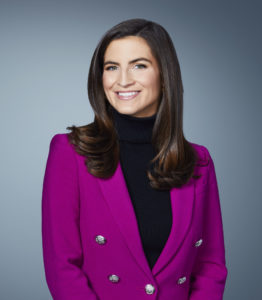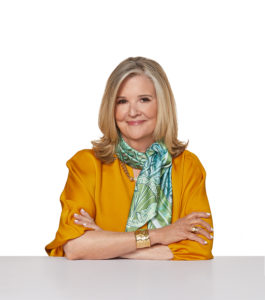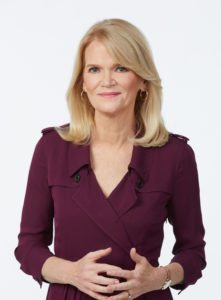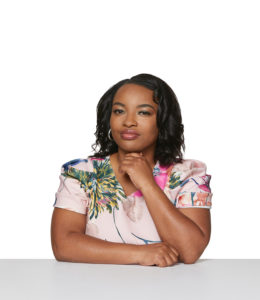Each year, Washingtonian helps sponsor the Washington Women in Journalism Awards to recognize outstanding reporters and editors for their work across all forms of media. This year’s winners have led the industry in covering politics, national security, and both foreign and domestic policy. They were honored at a reception on April 28.

Kaitlan Collins
Since joining CNN as a White House correspondent in 2017, Kaitlan Collins has broken several major stories and traveled across the globe with Presidents Trump and Biden. In 2020, at age 28, she became the network’s youngest-ever chief correspondent.
Where she grew up: Outside Montgomery, Alabama.
First byline: “I interned at the Tuscaloosa News. One night, Willie Nelson and Merle Haggard were coming to town for a concert and my boss couldn’t cover it. [He was] like, ‘Do you want to do it?’ The thing is, the newsroom was at the top of this hill, and the concert venue was down the hill. So I’m running up this hill at, like, 10:30 at night. I’m in the newsroom late—I felt so cool cranking out the story. I’m having lunch the next day with my friends, in a sandwich shop where they used to hang the paper on the wall. And we looked over and my story was on the front page.”
First journalism job: “Reporting at the Daily Caller.”
First big story: “I’d been at CNN for like a month, covering the White House, when Sean Spicer got fired and Anthony Scaramucci got hired. I remember it being this crazy day at the White House, with all of these changes happening in such a public fashion. That was the moment that I understood just how crazy covering the Trump administration was going to be.”
Work she is proudest of: “We were just in Warsaw, Poland, as the President was greeting Ukrainian refugees. Being on the ground just makes it so real. Then [I] look back on other trips, like when Trump met with Kim Jong-un in Singapore, [or ]when he went to Helsinki with Putin and, you know, sided with Putin over US intelligence agencies. It’s moments like that that are our biggest moments as White House reporters, and definitely mine.”
Best journalism advice she has received: “To work very hard, which sounds so simple. But I think when you’re filing late and you’re missing some social outing with your friends, it’s always important to remember the gravity of the moment, the importance of what you cover.”
Worst journalism advice she has received: “When I was interviewing at a few places [before being hired at CNN], they suggested I move off the White House beat and cover something else. And I knew that I wanted to stay at the White House, regardless of where I was working. Staying with that path really helped me in the end.”
Best journalism tip: “One of the things I wish I had known more when I graduated was how to get people to talk to you. I think so much of it is just being trustworthy and being fair. But you also have to be bold.”
What she would like to see change in the journalism industry to make it better for women: “I just think the best thing for women in journalism is for there to be more women in journalism.”
What drew her to journalism and why she has stayed in it: “The first semester after I started taking journalism classes was the first time I really enjoyed college. Ever since then, I’ve never looked back.”

Kathleen Parker
Syndicated Washington Post columnist Kathleen Parker has been writing for more than three decades. She won the Pulitzer Prize for Commentary in 2010 for columns “gracefully sharing the experiences and values that lead her to unpredictable conclusions.” She’s also author of the 2008 book Save the Males: Why Men Matter, Why Women Should Care.
Where she grew up: Winter Haven, Florida.
First byline: “You know, I may not know that. I do remember the first thing I wrote that appeared in the newspaper—and I should really say that I typed it, because all it was was an announcement of the Knights of Columbus meeting, the date, the time, and the place. But when I saw what I had typed in the newspaper, I was beyond thrilled.”
First journalism job: Reporting for the Charleston Evening Post. “The editors decided I should start in a bureau, which is not really the best way to go about initiating a young reporter. It’s much better to be under a lot of supervision and guidance. I was covering the towns of Moncks Corner, Goose Creek, and Hanahan, which are pretty much the way they sound, although they’ve become bigger towns now.”
First big story: “I wrote a story about the city manager of Hanahan, who had basically fooled the townsfolk about the millage rate. I will confess to you that I had no idea what a tax millage [or property tax] rate was, but the city manager sat me down and explained it all to me. I said, ‘Well, I’m sorry, I’m not a genius, but that sounds like the taxes are going up ten times more than what you’ve said.’ And he said, ‘Yeah, that’s true.’ I called my editor, and he said, ‘Write that! Write that!’ That was my fourth day on the job. I very quickly got promoted and moved back downtown. So I earned my stripes by exposing the Hanahan city manager—he was fired. And I got my first taste of what it’s like to make a difference.”
Work she is proudest of: “I can’t put my finger on any in particular. I care more about those columns that people would write me long letters about, or, you know, they put them up on the fridge behind the magnetic strawberry or whatever, because they mean something to people. That’s, to me, just the highest compliment.”
Best journalism advice she has received: “Don’t ever assume anything. Trust no one. And the old adage—‘If your mother says she loves you, check it out.’ Trust your instincts.”
Best journalism tip: “Read what you’ve written out loud. You’ll always hear the mistakes or the gaps that need to be filled.”
What she would like to see change in the journalism industry to make it better for women: “I just would love to see women support each other. There was a group in Washington that I was a member of. It was women in media who had reached a certain level—you would know their names—and we got together periodically. We’d host a special guest who would be—Democrat or Republican, didn’t matter—a woman who had achieved some new sort of landmark in her career. All the people I met there, I would feel free to pick up the phone and call. That’s helpful in a man’s world.”

Martha Raddatz
Emmy Award–winning journalist Martha Raddatz has spent more than two decades at ABC News covering national security, politics, and foreign policy. During her tenure, she’s been chief White House correspondent, chief global-affairs correspondent, and coanchor of This Week With George Stephanopoulos. Before joining ABC in 1999, Raddatz was a Pentagon correspondent at NPR and chief correspondent for ABC’s Boston affiliate, WCVB-TV.
Where she grew up: Salt Lake City.
First byline: “Oh, gosh, no one’s ever asked me that before. It must have been the TV station [KUTV, where I first started working] in Salt Lake City. I don’t really even remember what the first story I did was.”
First journalism job: “At KUTV. I really had no idea what I was doing, but I knew I liked it.”
First big story: “There was a trial for the [Massachusetts] Secretary of Transportation in Boston, and he was taking money under the table. I remember people came in with bags of cash and he just took it.”
Work she is proudest of: “I wrote a book about a battle [in Iraq] in April 2004, and National Geographic turned it into an eight-part miniseries. Eight soldiers died, and that was the largest loss of life for the First Cavalry Division since the Vietnam War. I interviewed a group of them after [the battle]. I think it was completely eye-opening for people that [the United States] was still coming into and occupying [Iraq], and then it was kind of the beginning of the insurgency that would last for a decade.”
Best journalism advice she has received: “To listen. I can’t remember who said that to me, but it is the absolute best advice no matter what you’re doing. Open your ears and try to understand. You can’t ask good questions if you don’t listen. You can’t write a good story if you don’t listen. You can’t learn more, which is really what we want to do. Right? We want to learn more and stay curious.”
Worst journalism advice she has received: “I never studied journalism in college, but I decided to take a journalism class. I dropped out of it within a week because the professor told a story about when he’d gone on a story and they were carrying down whatever they found in the mountains [after] a plane crash. He missed them carrying this stuff down, and they volunteered to do it again. He thought that was great, and I thought that was fake. That’s staging news.”
Best journalism tip: “I can’t remember a story that I wasn’t interested in. There is a story in everything you’re assigned. There’s more to hear and more to probe, no matter what it is.”
What drew her to journalism and why she has stayed in it: “It satisfied my curiosity. When I look back at the fact that I dropped out of college, I think I just wanted to learn every day to make up for that, in a way. It sparked something in me. I was just walking around Warsaw, Poland, with an old photographer friend, and we both said that we’re so lucky. This is what we love about our jobs: to be able to see new things and learn new things.”

Ayesha Rascoe
Ayesha Rascoe spent a decade covering energy and the White House for Reuters before joining NPR as White House correspondent in 2018. She’s now the host of Weekend Edition Sunday and a regular on the NPR Politics podcast.
Where she grew up: Durham, North Carolina.
First byline: “The first story I wrote was for the teen section of the Durham Herald-Sun. It was about a teenage girl who was an award-winning barrel racer. I actually rode a horse.”
First journalism job: “My first full-time gig was at Reuters. I interned for them right out of college, then I was hired as a news assistant for the commodities-and-energy team.”
First big story: “Covering the BP oil spill.”
Work she is proudest of: “When Trump was in office, I did two big projects looking at Trump tweets and how those tweets were aimed at people of color. I found that Trump did insult everyone, but he was very quick to call Black people ‘dumb.’ That was his go-to insult. He had lots of enemies, but those people weren’t called dumb. It just showed how his language was getting more dark and aggressive.”
Best journalism advice she has received: “Be open to opportunities. You never know what you could end up doing. Also, just be open to learning new skills and new types of journalism.”
Worst journalism advice she has received: “There used to be this idea that you had to go from a small-sized paper to a medium-sized paper. I don’t think this [path in journalism] is there anymore. People are still trying to tell [others] that you have to go this certain route. There isn’t one set path, and there are many different ways to end up where you want to be.”
Best journalism tip: “Always ask, ‘Do you have anything else to say?’ at the end of an interview. That is when you get some of your best quotes. A lot of times, people will have such a sharp point or say that thing you didn’t even know about until they bring it up at the end. You can get a sense of what is really important to the person.”
What she would like to see change in the journalism industry to make it better for women: “Pay women more. It will help the industry because there will be less turnover. [Women] will be able to do their work better because they will be less stressed about all these other things they have to do.”
What drew her to journalism and why she has stayed in it: “I took an aptitude test [in middle school], and it said I was good at journalism. There were times where I didn’t know that I was going to stay in journalism, because I didn’t know what I was giving to the world. It took a long time for me to figure out that what I do is actually of value.”
Past Winners
2021
Yamiche Alcindor | PBS
Karen Attiah | Washington Post
Susan Glasser | New Yorker
Norah O’Donnell | CBS
2020
Rita Braver |CBS
Molly Ball | Time
Anna Palmer | Politico
Kristen Welker | NBC
2019
Andrea Mitchell | NBC
Ashley Parker | Washington Post
Abby Phillip | CNN
Amanda Terkel | HuffPost
2018
Amanda Bennett | Voice of America
Audie Cornish | NPR
Lynn Sweet | Chicago Sun-Times
Amy Walter | Cook Political Report
2017
Mary Katharine Ham | CNN
Mary Louise Kelly | NPR
Jane Mayer | New Yorker
Cokie Roberts | NPR/ABC/PBS
2016
Dana Bash | CNN
Kathryn Lopez | National Review
Susan Page | USA Today
Carolyn Ryan | New York Times
This article appears in the June 2022 issue of Washingtonian.
















